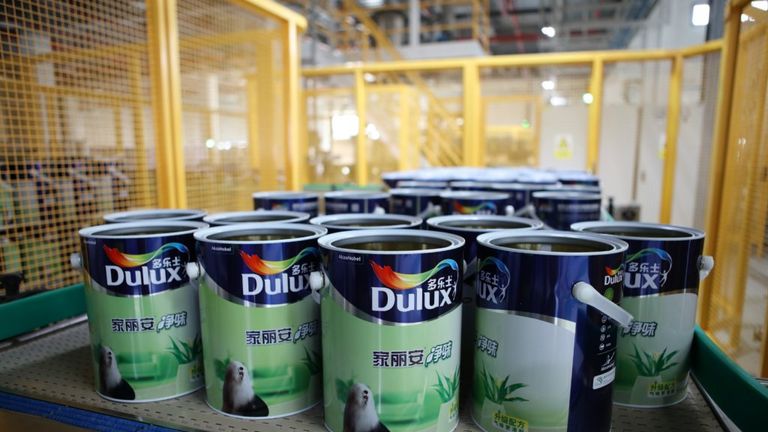Takeover offer for owner of Dulux has big implications for UK
Sky's Ian King says a US approach for Azko Nobel would threaten UK jobs and wider economic damage if it resulted in a takeover.
Wednesday 22 March 2017 16:32, UK
Imperial Chemical Industries, or ICI for short, was once the bellwether for Britain's industrial sector and one of the country's most famous companies - until it was taken over for £8bn in 2008.
Now Akzo Nobel, the Dutch chemicals and paints company that bought ICI, is itself fighting for its own independence.
The company, which traces its origins all the way back to 1646, has received an unwanted €22.4bn (£18bn) takeover approach from America's PPG Industries, the world's biggest supplier of car paints, which today raised its offer.
Ordinarily, an American company bidding for a Dutch one might seem of minimal interest in Britain, but not in this case.
Akzo Nobel employs getting on for 3,500 people here in the UK, manufacturing famous brands such as Dulux paint, Polycell wood and wall filler and Hammerite, the metal paint. PPG, too, has a significant UK presence.
The owner of brands including Leyland Paint and Johnstone's Paints, it has 10 manufacturing and R&D sites across the country, mainly in the Midlands and Yorkshire.
A combination of the pair would probably lead to a significant number of job losses in the UK and could also harm the UK's balance of payments.
While three in every four tins of paint sold in the UK is made here, 30% of all paint manufactured in the UK is sold overseas, making Britain a net exporter of paint. The industry, whose annual UK sales last year were £2.4bn, is a significant export earner for the country.
Akzo Nobel has a fight on its hands. Elliott, the US activist investor, revealed last week that it has built up a stake of more than 3% in the Dutch company and today said that, while PPG's latest offer for the business was "inadequate", it was urging its management to start talking to their American counterparts.
Colombia Threadneedle, another of Akzo Nobel's top 20 shareholders, has also called on the company to engage with PPG.
The backdrop to the takeover approach is that there has been a wave of tie-ups in the paints sector as well as in the wider chemicals sector. The two US giants Dow Chemical and DuPont have announced plans for a $120bn merger; Germany's Bayer is trying to buy Monsanto, the agri-business company, for $57bn and, in paints, while Sherwin-Williams is on the point of completing a $9bn takeover of its US rival Valspar, the world's sixth-largest paint manufacturer.
Akzo still has plenty of cards to play. Some 45,000 jobs depend on it globally, many of them in the Netherlands, while local politicians, including the Economy Minister Henk Kamp, have already argued that the deal would not be in the Dutch national interest. Dutch takeover rules may also come to its defence as they oblige directors to evaluate whether a merger or takeover is in the interests of wider stakeholders.
And, even before its starts building a takeover defence based on the quality of its management, Akzo Nobel can also mount other formidable defences. A foundation exists that owns priority shares that can more or less prevent a hostile takeover because it has "ultimate discretion" over who sits on Akzo Nobel's management and supervisory boards.
Yet the Dutch takeover rules may also benefit PPG, since they allow a bidder to sweeten their terms at any time, even after their official offer has been posted. PPG can also point out that, under the latest terms it has tabled, Akzo Nobel shares are valued at 40% more than the price at which they were trading before it made its interest public.
Any takeover is likely to be pored over by competition watchdogs. This takeover would see the world's biggest maker of paints and coatings taking over the second-largest. America's anti-trust authorities will also be watching closely.
They investigated five suppliers, including PPG and Akzo Nobel, 16 years ago for possible price-fixing of car refinishing products. There is also likely to be interest from the Competition & Markets Authority here as to whether a combination of the two companies would create a business with a dominant position in the supply of paint.
This saga potentially has a long way to go - and thousands of British workers will be watching anxiously.




